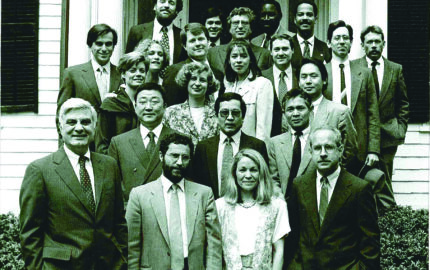The Nieman Foundation was founded nearly 70 years ago on the idea that education could enable reporters to work at higher levels of excellence, which over time would help elevate the standards of journalism. In that spirit, Nieman Reports was established in 1947 in response to the Hutchins Commission’s call for a forum that would offer regular and serious criticism of the press. During his decade as curator, Bill Kovach raised the Nieman Foundation’s profile as a voice for the standards of journalism. He and coauthor Tom Rosenstiel organized a conversation among news people and citizens as they identified the principles that underlie journalism in their book, “The Elements of Journalism: What Newspeople Should Know and the Public Should Expect.” We are also utilizing a gift of Murrey Marder, a 1950 Nieman Fellow, to advance the critical role of journalists as watchdogs with Niemanwatchdog.org. Through our Narrative Journalism program we are educating the fellows and those who attend our annual narrative conference.
Serving the foundation’s mission is foremost as the staff and Nieman Advisory Board work to respond to a major question in journalism today: how to sustain high-quality journalism as the news media move their reporting online and confront differing standards practiced by various news and information enterprises in the digital media.
Following several months of discussion, the foundation plans to launch an interactive online resource to aggregate important information about best practices in preserving and advancing journalism that adheres to its fundamental principles. Included on the site will be information about developments in newsgathering and presentation, the management of digital news enterprises, the creation of new economic models, and the emergence of new technologies. The Nieman Foundation envisions this as being a vital online resource for journalists, business people, public officials, scholars and citizens worldwide.
Michele McLellan, a 2002 Nieman Fellow and a former editor for The Oregonian, is serving as editor for building and launching the Web site. Since 2003, Michele has been founding director of Tomorrow’s Workforce, a Knight Foundation project located at Medill School of Journalism at Northwestern University.
The content outline addresses these four topic areas:
New practices in journalism: Involving hyperlocal journalism, community journalism, citizen or open-source journalism, blogs, multimedia and new print products. Good examples of new practices that perpetuate such traditional concepts as beat reporting, investigative journalism, and explanatory journalism will be featured.
Ethics and values: Exploring these aspects of new challenges, such as relinquishing control of content, monitoring content, and interacting with audiences.
The business of journalism: Passing along information about emerging business models, strategies, nonprofit or grant-supported journalism.
Leadership in news organizations: Examining leadership challenges, including managing change, organizational development, and operating a 24/7 newsroom.
Within each of these topics, the site would offer the following kinds of information:
- A digest of timely articles on key editorial, business and technological developments affecting journalism.
- Examples of developing best practices that help ensure journalistic quality and/or financial viability.
- Links to workable ideas, along with essays explaining how the ideas came to life, what problems and setbacks were encountered, and how they are being executed.
- Transcripts, Webcasts and Podcasts of important speeches, workshops and conferences dealing with relevant topics.
- Q&A interviews with key leaders and innovators in journalism, business, research and related areas.
- Guest columns from experts, including Nieman Fellows, past and present.
- Links to critical research findings and polling results from outside sources.
- Interactive discussions among practitioners, scholars, entrepreneurs and citizens.
- A calendar with links to upcoming events related to the site’s mission.
In addition to building the Web site, the Nieman Foundation and the Harvard Business School are exploring a partnership in initiating research on the intersection of quality journalism and new business models in the digital era. Such an ambitious undertaking invites ideas, suggestions, comments and offers of help. Nieman alumni and other readers of Nieman Reports are encouraged to weigh in.



